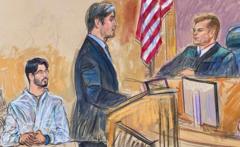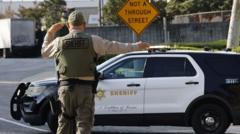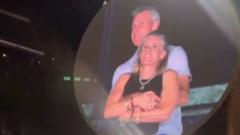The suspect in the shooting of two Israeli embassy workers outside a Jewish museum has been charged with multiple crimes, including first-degree murder. The case is being treated as a hate crime with increased scrutiny on motivations and potential bias.**
Tragedy Strikes: Murder of Israeli Embassy Workers in DC Investigated as Hate Crime**

Tragedy Strikes: Murder of Israeli Embassy Workers in DC Investigated as Hate Crime**
Charges filed against Elias Rodriguez following Monday’s shooting of two Israeli embassy employees in Washington, D.C. as investigations unveil connections to hate crime motivations.**
In a shocking incident that has drawn widespread condemnation, the suspect accused of fatally shooting two Israeli embassy staff members in Washington, D.C. has been charged with first-degree murder, including murder of foreign officials and firearm-related offenses. The tragic event unfolded outside the Capital Jewish Museum, where Yaron Lischinsky and Sarah Lynn Milgrim were shot during an event on Wednesday night. The attack, now classified as a hate crime, has sent ripples of fear through the Jewish community and prompted calls for increased security measures.
The alleged shooter, identified as 30-year-old Elias Rodriguez from Chicago, was arrested shortly after the shooting, which took place at approximately 9 PM local time. Reports indicate that Rodriguez opened fire on a group of attendees, resulting in the immediate deaths of Lischinsky and Milgrim. U.S. Attorney Jeanine Pirro remarked at a press conference that this case is eligible for the death penalty, although it remains uncertain if prosecutors will pursue such a course.
FBI officials have characterized the violence as "an act of terror" aimed directly at the Jewish community. Eyewitnesses described a surreal scene in which Rodriguez, initially thought to be a distressed bystander, was aided inside the museum before revealing his violent intentions. Witness reports further reported him shouting "free Palestine" during his arrest.
Rodriguez’s recent arrival in Washington is under scrutiny, with authorities examining his movements prior to the attack, including a flight from Chicago for a work conference. Social media activity linked to Rodriguez suggests he was involved in pro-Palestinian activism and had expressed strong anti-Israel sentiments. This raises questions about the motive behind the attack, as officials delve deeper into his digital footprint.
Inside the community, Lischinsky was remembered fondly with Israel’s ambassador acknowledging their engagement plans for a trip to Jerusalem. A vigil for Milgrim, who had previously expressed concerns about rising antisemitism in the U.S., was scheduled in her hometown of Kansas City.
As authorities investigate the background of Rodriguez, neighborhood sources revealed a photograph outside his residence celebrating a Palestinian-American child who was killed in a hate-crime incident earlier this year. Further inquiries into his affiliations and motivations are ongoing, as local police search his home and electronic devices for any potential clues.
Political leaders around the world have condemned the attack, emphasizing the need for unity against antisemitism. UK Prime Minister Keir Starmer and Israeli Prime Minister Benjamin Netanyahu have both denounced the shooting, with Netanyahu highlighting it as a "heinous antisemitic murder."
The shocking nature of this case not only highlights the risks faced by minority communities but also prompts a necessary conversation about the implications of social movements in fostering hostility. As the investigation continues, the hope remains for justice for Lischinsky and Milgrim, and a resolution to the deeper issues of hatred that this incident has exposed.




















